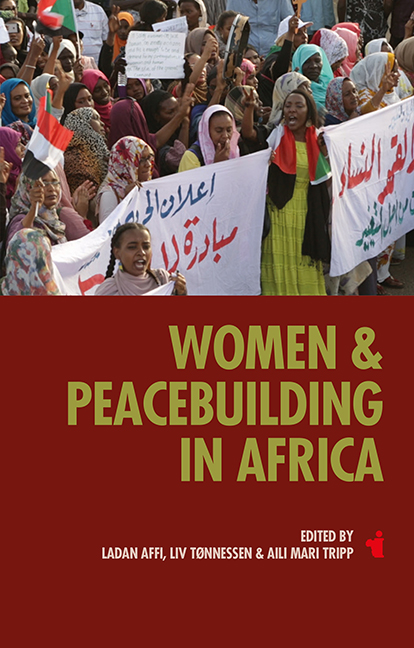Book contents
- Frontmatter
- Contents
- List of Illustrations
- Notes on Contributors
- Acknowledgement
- Abbreviations
- Maps
- 1 Introduction: The Gendering of Peacebuilding in Africa
- 2 Women Activists’ Informal Peacebuilding Strategies in South Sudan
- 3 ‘Ba Sa Jin Mu’ (They Don’t Listen to Us): Women and Peacebuilding in North-Eastern Nigeria
- 4 No Going Back: Somali Women’s Fight for Political Inclusion
- 5 Sudanese Women’s Demands for Freedom, Peace, and Justice in the 2019 Revolution
- 6 The Fight for Democracy and Women’s Rights in Algeria: A Long Legacy of Struggle
- 7 Conclusions: Women’s Peace Activism in Africa
- Bibliography
- Index
4 - No Going Back: Somali Women’s Fight for Political Inclusion
Published online by Cambridge University Press: 26 May 2022
- Frontmatter
- Contents
- List of Illustrations
- Notes on Contributors
- Acknowledgement
- Abbreviations
- Maps
- 1 Introduction: The Gendering of Peacebuilding in Africa
- 2 Women Activists’ Informal Peacebuilding Strategies in South Sudan
- 3 ‘Ba Sa Jin Mu’ (They Don’t Listen to Us): Women and Peacebuilding in North-Eastern Nigeria
- 4 No Going Back: Somali Women’s Fight for Political Inclusion
- 5 Sudanese Women’s Demands for Freedom, Peace, and Justice in the 2019 Revolution
- 6 The Fight for Democracy and Women’s Rights in Algeria: A Long Legacy of Struggle
- 7 Conclusions: Women’s Peace Activism in Africa
- Bibliography
- Index
Summary
Introduction
When the Governor of Bay, a region in southern Somalia, visited a school for internally displaced and poor female students in Baidoa, he asked a 15-year-old girl what she was going to do when she finished her education. She replied, ‘I am going to replace you’ (Ali 2020). For a young Somali girl to have political ambitions is not surprising and represents women's desire to participate in the politics and governance of their country.
In the past 80 years, in which women have pursued a quest for full political participation and representation, Somali women have continued to be treated as a minority, despite making up over half of the population and making critical economic and social contributions to society. This chapter seeks to document women's struggle to participate in the governing of Somalia in the longue durée by examining three distinct periods – the anti-colonial resistance period (1940s–60), the socialist period (1969–91) and the civil war to the present (1991–present). Women were systematically prevented from having any political impact until recently. At each stage, women were welcomed when their activities were needed by society, yet they were repeatedly sidelined once their participation was no longer seen as necessary by those in power. In fact, excluding ‘women from sharing in the fruits of these struggles’ is a consistent theme throughout the modern history of Somalia (Jama 1994, 200).
Methods
This study is based on fieldwork carried out primarily between 2016 and 2019 in Somalia (Bur’o, Garowe, Hargeisa, and Mogadishu), in Nairobi, Kenya, and Minneapolis, United States. Those interviewed included women activists and women's NGO leaders and staff; male and female members of the 2016 Electoral College; male and female members of Parliament in Somaliland, Puntland, and the federal government; former officials under the Barre government and the transitional federal government; local councillors in the Benadir Regional Government; Cabinet ministers in Somaliland, Puntland, and the Federal Government; clan elders; staff of international organisations and diplomats in Nairobi, Kenya; and diaspora activists for women's rights in Somalia and the United States. Most of the interviews were carried out in person, a few were carried out in groups, and some over the phone.
- Type
- Chapter
- Information
- Women and Peacebuilding in Africa , pp. 79 - 102Publisher: Boydell & BrewerPrint publication year: 2021

